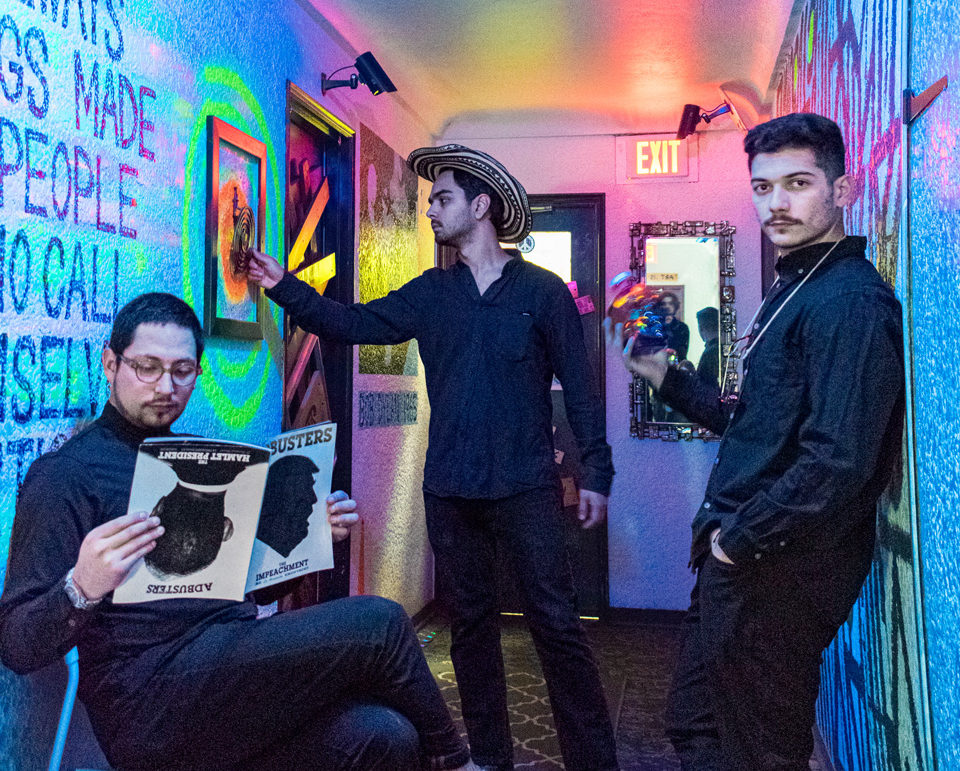“We start super quiet. And all the effects and instruments begin to emulate the sounds of the jungle. And it would build up. And when we all fully start, the crowd just explodes. It makes this mess of cacophony. Literally just a sludge of fucking sound, not even music.”
I first experienced the hypnotic, entrancing live show of Empanadas Ilegales dancing alongside three pirates and a leather-clad cat. It was the night of Halloween 2021, and I had ended up at a gig in a Richmond parking lot, not knowing what to expect. When the band emerged, they began to play a slow, sultry tempo that developed into an intricate and groovy dance beat as the crowd picked up on their energy. Latin, jazzy, psychedelic, spooky, fun — they synthesized a fusion of genres into a sound that was completely novel to me. As the show evolved, I was amazed by the level of synchronous mutual understanding that can be heard in their music. The performers feed into each other with curiosity, and also seem to respond to the energy of the crowd, almost teasing us, building suspense in just the right way, each release channeled electrically into movement. Their performance that night fed some deep craving within me that I didn’t know I had, and I’ve been a fan ever since. One year on, I’m sitting down with the current four core members of Empanadas Ilegales, and I am extremely excited.
Their style is heavily influenced by the Latin music genres of cumbia and, increasingly, salsa. The band’s incorporation of dissonant tones, eerie atmospherics, and haunting guitar leads are stylistic signifiers of their ‘spooky’ undertone that blends into their psychedelic sound. I begin our interview by asking about a recurring ad-lib that shows up in their performances.
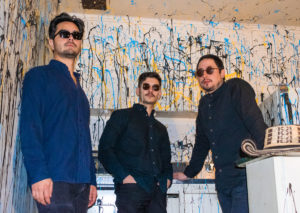
What’s the origin of the evil laugh? (For those unfamiliar with an Empanadas Ilegales performance — there is a high chance of you hearing a deep bellowing ‘mwahaha’ echo out periodically)
Alonso: …The what? Oh, that! Well, this genre is generally instrumental, and as the music plays, there’s usually someone in the band who will start “call and response” sounds, like nature sounds, for example. It works really well in our music — it just ties things together.
Ricardo: And then, it also adds to the psychedelic vibes. It’s part of the theme, right? Spooky.
Alonso: Halloween here is what gets the closest to the carnival spirit from Latin America. People dress up, play characters, and dance. It’s a giant celebration. Here, there’s something transgressive about Halloween.
Daniel: Like, they do fireworks on Halloween in Vancouver! Even though it’s illegal — I think? And yet, it still happens, right?
Alonso: Halloween is the only real time where that kind of spirit emerges.
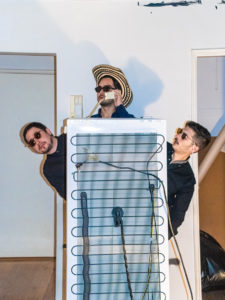
How did you come together as a group?
Ricardo: When we all started playing together, we were just a jam group. We used to go to a lot of the same house parties where people would come and jam, but we’d all end up consistently jamming together.
Jaime: Back in the day, we were mostly playing blues and rock. Eventually, we were like, hey, why don’t we start a project? We all had the idea that we wanted to do latin music. We were like, forget all the blues rock, you know, like fuck that.
Daniel: The concept of incorporating more of the psychedelic sound also came from when I had a show with CiTR, actually. I had this concept of a new experimental psychedelic cumbia sound. I was just really craving it. These ideas were burning in my mind, and I was restless to develop them.
With such an experimental sound, how do you describe your style of music?
Jaime: Oftentimes I’ll say, oh, we’re like psychedelic salsa, and people will just look at me strangely, and go ‘Oh, cool,’ but they don’t really know what it is, right? So I’ll usually follow up with something like “Latin Jazz with weird sound effects,” and they’re like, ‘Oh, okay, cool.’
Ricardo: People get excited about it because they think it sounds interesting, but still, nobody really knows what it is. So at our shows new people don’t know what to expect. And then all of a sudden this musical bomb drops, and they’re like, holy shit. They can’t stop dancing all of a sudden — you know?
Daniel: So our ‘genre’ is psychedelic salsa, and then the concept of how we mix it all together, how the sound evolves, would be more like ‘creepy mambo,’ which is the name of our second album. When we started, we were only doing cumbia, but we wanted to also do salsa because it’s what we all love. But it’s much more complicated to play. Salsa generally involves a huge orchestra of percussion. Little by little we were growing towards it and then eventually, with Alonso on the drums, all of a sudden we were like, okay, we can do salsa now. We call him the octopus, because he’s just carrying everything.
Jaime: Another thing that defined an evolution from the first album to the second album was how we approach the guitars. For me, it was like I stopped treating the guitar as a lead instrument, like I always had when playing blues and rock. I started to see the guitar as more of a percussion instrument that’s just flowing in the pockets between the beats. I could just play and think about what would be best for the composition.
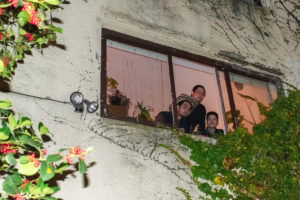
What’s the story behind the name of the band?
Daniel: We were just hanging out at home one day, making empanadas, and then someone brought one out and put it on top of conga, and we were like, look, it’s an Illegal Empanada [laughs].
The true source of the phrase ‘Empanadas Ilegales’ actually originated from [an event during] 2012 in Bogota, Colombia, when street vendors were basically prohibited from selling empanadas. And so, empanadas went through a kind of period where they were actually illegal to buy or sell. But it’s absurd — how could empanadas be illegal? Maybe if they have, like, cannabis in them or something, I don’t know… maybe it’s up for the listener to decide.
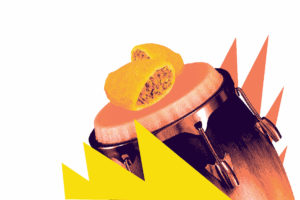
What do you like to see in the crowd? What kind of reaction gives you energy as performers?
Ricardo: The dance energy is everything. Especially when we’re playing a show where the other bands have more of a chill vibe, it’s amazing to see people light up when we come on.
Jaime: All I want is to see people dancing. It comes naturally, you don’t need to know how to dance Salsa or anything. Seeing people just move their bodies through the music we play together is what makes me the happiest.
Ricardo: Yeah, that gives you so much energy when you’re performing. When we reach that point while playing, where we all kind of connect with each other, and it stops being about what you have to play, and instead becomes a kind of feeling — that’s amazing. It feels like you’re floating. You’re not even thinking, you’re just having fun.
Any final message to the readers?
We’d like to invite everyone to give us a listen. We’d love to see you at our next show. Come dance with us! We’re just going to focus on writing new stuff, so that next summer, we’ll be bringing the fresh empanadas. We’re all really excited to be working on making new music and the third album.
Follow Empanadas Ilegales on Instagram for upcoming shows, music updates, and to get in on their good energy // @empanadasilegaless. You can purchase their new limited edition vinyl through the link in their bio.


